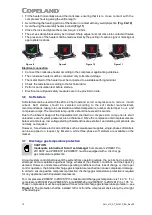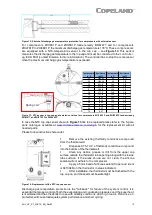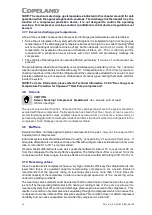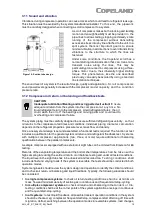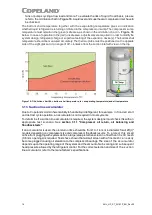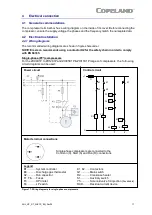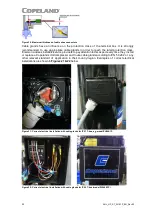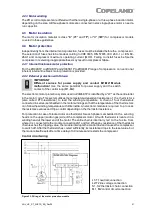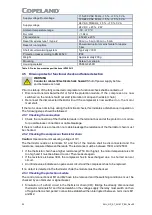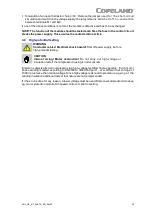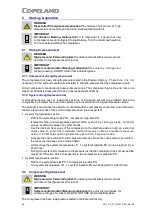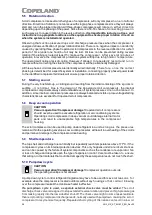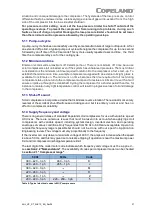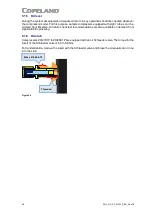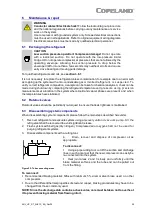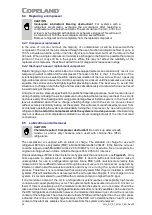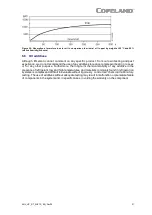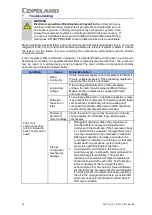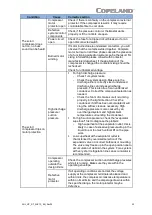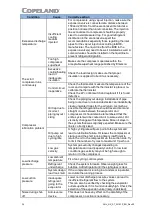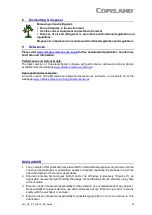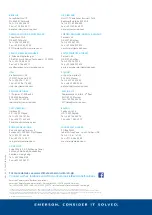
26
AGL_HP_ST_ZHK1P_EN_Rev00
5.6 Rotation direction
Scroll compressors, like several other types of compressors, will only compress in o ne rot ational
direction. Direction of rotation is not an issue with single-phase compressors since they will always
start and run in the proper direction. All three-phase compressors will ro tat e in eit her direct ion
depending upon the phasing of the power. Since there is a 50-50 chance of connect ing p ower in
such a way as to cause rotation in the reverse direction
, it is important to incl ude notices and
instructions in appropriate locations on the equipment to ensure proper rotati on di r ecti on
when the system is installed and operated
.
Observing that suction pressure drops and discharge pressure rises when the compressor is
energized allows verification of proper rotation direction. There is no negative impact on durabilit y
caused by operating three-phase Copeland scroll compressors in the reversed direction for a short
period of time (under one hour) but oil may be lost. Oil loss can be prevented during reverse
rotation if the tubing is routed at least 15 cm above the c ompressor. Af t er s everal minut es of
operation in reverse, the compressor's protection system will trip due to high mot or t emperat ure.
The operator will notice a lack of cooling. However, if allowed t o repeatedly res t art and run in
reverse without correcting the situation, the compressor will be permanently damaged.
All three-phase scroll compressors are identically wired internally. Theref ore, o nc e t he correc t
phasing is determined for a specific system or installation, connecting properly phased power leads
to the identified compressor terminals will ensure proper rotation direction.
5.7
Starting sound
During the very brief start-up, a clicking sound resulting from the initial contacting of the s pirals is
audible
– it is normal. Due to the design of the Copeland scroll compressors, the internal
compression components always start unloaded even if system pressures are not balanced. In
addition, since internal compressor pressures are always balanced at start -up, low-voltage starting
characteristics are excellent for Copeland scroll compressors.
5.8
Deep
vacuum
operation
CAUTION
Vacuum operation! Compressor damage!
Copeland scroll compressors
should never be used to evacuate refrigeration or air-conditioning sy stems.
Operating scroll compressors in deep vacuum could damage internal motor
parts and lead to unacceptable high temperatures in the compressor
housing.
The scroll compressor can be used to pump down refrigerant in a unit as long as t he press ures
remain within the operating envelope. Low suction pressures will result in overheating of the scrolls
and permanent damage to the compressor drive bearing.
5.9
Shell
temperature
The top shell and discharge line can briefly but repeatedly reach temperatures above 177°C if t h e
compressor cycles on its internal protection devices. This only happens under rare circums tances
and can be caused by the failure of system components such as the condenser or evaporator f an
or loss of charge and depends upon the type of expansion control. Care must be taken t o ensure
that wiring or other materials that could be damaged by these temperatures do not touch the shell.
5.10 Pumpdown cycle
CAUTION
Vacuum operation! Compressor damage!
Compressor operation o utside
the operating envelope is not allowed.
A pumpdown cycle to control refrigerant migration may have to be used for sev eral reas ons, f or
example when the compressor is located outdoors without any housing so t hat cold air b lowing
over the compressor makes the crankcase heater ineffective.
If a pumpdown cycle is used, a separate external check valve must be added
. The scroll
discharge check valve is designed to stop extended reverse rotation and prevent high-pressure gas
f rom leaking rapidly into the low side after shut-off. The check valve might in some cases leak more
than reciprocating compressor discharge reeds, normally used with pumpdown, causing the scro ll
compressor to recycle more frequently. Repeated short cycling of this nature can result in a low oil

